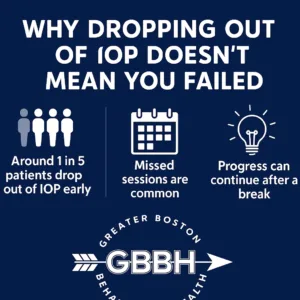Your stomach drops. You see the name on your phone screen—your therapist, your case manager, a number you recognize from the program. You don’t answer.
Not because you don’t care. But because it’s been a week. Maybe two. You missed one session, then another. Somewhere in there, you stopped showing up. And now?
You don’t know how to come back.
This blog was written for that moment. If you’ve ghosted your IOP, dropped out, or just slowly drifted away—we’re not here to judge you. We’re here to help you understand what happened, why it’s more common than you think, and why you’re not broken or beyond repair.
Our IOP program in Boston welcomes returners—and this is your open-door invitation to come back without shame.
Why People Drop Out of IOP (And Why It’s Not a Failure)
Let’s be honest: nobody starts treatment hoping to disappear halfway through. But life happens—and sometimes, it gets in the way of your healing.
Here’s what we see most often:
- Overwhelm from daily life: Managing work, childcare, or school alongside an intensive outpatient program is no small feat. When stress piles up, treatment is often the first thing to slip.
- Emotional fatigue: Sometimes therapy stirs up more than you expected. When emotions feel too raw or progress feels too slow, it’s tempting to shut it all down.
- Logistics breakdown: Missing a ride. Losing Wi-Fi. Forgetting a group schedule. These might sound like excuses, but they’re real barriers—especially if you’re already struggling.
- Shame spiral: You miss one group. Then two. Then it’s easier to avoid than to explain. The longer it goes, the harder it feels to return.
None of these reasons mean you failed.
They mean you’re human. And that the structure of your life may need to shift to better support your recovery—not the other way around.
Disappearance Is Normal in Mental Health Work
At Greater Boston Behavioral Health, we see it all the time: clients who start strong, hit a wall, disappear—and then come back.
We build our IOPs with this in mind.
In mental health care, dropping out doesn’t mean you’re uncommitted. It often means you reached a point of internal resistance, external strain, or emotional overload.
In fact, taking a pause can sometimes reveal the exact work that still needs to be done.
You’re Still Welcome—Even If You Ghosted
This part is crucial: You don’t need to explain everything to be welcomed back. You don’t need a polished apology. You don’t need to perform your guilt to prove you care.
Just reach out.
At Greater Boston Behavioral Health, we don’t lead with policies. We lead with people. That means we treat every reentry conversation like a reconnection—not a discipline meeting.
No lectures. No punishment. Just a chance to talk, reconnect, and figure out what makes sense now.
Looking for IOP in Boston, Dedham, or Needham? Our doors are still open—no matter how long you’ve been away.
What Coming Back Might Actually Look Like
You don’t have to start over completely. You don’t have to explain every detail of what happened. Here’s what reentry often looks like in our IOP:
- A simple phone call or email to say, “I think I’m ready again.”
- A no-pressure conversation with your therapist to regroup.
- A revised schedule if your old one didn’t work.
- An invitation to just attend one group—no full reintake required (unless clinically necessary).
- A plan to ease in slowly, based on your actual life—not just the ideal version of it.
The biggest hurdle? Usually just reaching out.
Once you do, we help with the rest.
Guilt Is Not a Sign You Should Stay Away
That heavy feeling in your chest—the one saying you blew it, or that they won’t want you back—that’s not truth. That’s guilt. And while guilt can be a signal of your values, it’s not a reason to give up.
If anything, your guilt shows that you care. That you’re still attached to your progress. That part of you still wants to feel better.
Let that part speak.
You Don’t Need to Be “Ready Forever” to Return
Many people believe they can’t come back to IOP until they feel totally stable or perfectly committed. But IOP isn’t for when you’re fully ready. It’s for when you’re trying.
If you’re even thinking about reconnecting, that’s a good enough reason to reach out.
Healing Is Nonlinear—And That’s Okay
You didn’t ruin your progress. You didn’t “waste” your sessions. The work you did is still there. The insight you gained is still yours.
Coming back isn’t starting over. It’s continuing.
At a new pace. With a little more self-knowledge. With a team that already knows you—and wants to walk alongside you again.
Quick Tips for Re-Engaging With IOP After a Break
Quick Tips for Re-Engaging
- Start with a message, not a full conversation. A short email or voicemail is enough.
- Name your hesitation. It’s okay to say, “I feel weird coming back, but I want to.”
- Ask about options. We can explore partial schedules, hybrid sessions, or other flexible formats.
- Don’t punish yourself with “shoulds.” Focus on what you can do now—not what you think you should’ve done.
- Remember: it’s your treatment. You’re allowed to adjust it as you grow.
FAQ: What If I Want to Come Back After Dropping Out?
What if I ghosted and it’s been months?
That’s okay. We don’t track absences to shame you. We’d rather hear from you than wonder how you’re doing.
Do I have to start from scratch?
Not usually. If you’re returning to the same program and provider, we can often pick up close to where you left off—unless your needs have significantly changed.
Will I be judged or lectured?
Nope. Our team is trained to welcome clients back without shame. Your return is a sign of strength, not failure.
Can I just come to one group to see how it feels?
Yes. We often recommend easing back in with a single session or check-in. You don’t have to commit to a full schedule on day one.
What if my schedule doesn’t work with IOP anymore?
Let us know. We may have evening options, hybrid sessions, or a different level of care that fits better.
Ready to reconnect?
Call (888) 450-3097 or visit our IOP services in Boston, Massachusetts to talk with someone who gets it. You’re not broken. You’re just not done yet.


